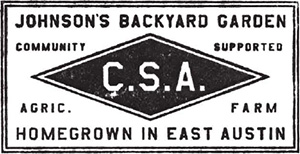
IT'S ALL IN THE PLANNING
02/24/09 — Aaron

Table of Contents 1) In Your Box this Week
2) Farm News
- A New Crop Planning Tool
- Food and Politics Book Club
- New Equipment
- Log into Your Account
- The Spotted Cucumber Beetle
- Permaculture Design Course
- El Jardin Alegre/ Local Living Center
4) Quotable Food 5) Recipes
- Pumpkin Rice with Kale
- Italian Cabbage Soup
6) Vegetable Storage Tips 7) Johnson's Backyard Garden Contact Information
Please send newsletter feedback, suggestions and contributions to farm@jbgorganic.com
We're on MySpace, be our friend! We're also on Facebook!

1) In Your Box this Week:
Swiss Chard Carrots Broccoli Florets Kale Cabbage Collards Spinach Brussels Sprouts Mint Parsley Oranges Grapefruit
This list is subject to change depending on availability and quality of crops on harvest day. You'll find the most accurate packing list on the homepage of our website.
2) Farm News
- A New Crop Planning Tool- Aaron, our computer programmer, is in the process of creating a program that will help us, among other things, plan crop rotations, track seeding and greenhouse schedules, alert us when seed inventory is low, and most importantly assist in calculating how much we need to grow to fill everyone's weekly share box. He's gleaned all the info he can from work that Carolyn started last year, details I've added since November and what knowledge Brenton can offer from years of experience. Now if we could just get the program to do all the data entry on its own, we would all be happy campers.
- Food & Politics Book Club - In a lapse of brain function last week, I did not credit Grit Ramuschkat with the excellent article on the book "Banana - the fate of the fruit that changed the world" and general happenings with the book club that meets at her home on the farm. However, it looked like she had a great turnout for the session over the weekend. I've heard exciting reports on the text, so if you're interested in honey or bees it's a must read. The groups next meeting is scheduled for April 4, the next title on the list will be "Stuffed and Starved: the Hidden Battle for the World's Food System" by Raj Patel. For more information about Book Club Meetings, go to: http://www.meetup.com/Food-and-Politics-Book-Club/ You are warmly invited to join the Food & Politics Book Club!

- New Equipment arrived last Saturday. Will was induced out of his morning sleep to help unload the semi-truck on his day off. What a trooper....What is this strange new piece of equipment? After a few moments of uninformed inspection, I discovered that this implement will assist in the potato harvest later this spring. As I understand it, last years potato harvest was quite the undertaking, requiring a mass of volunteers and several hours of back-breaking work. If you participated in last years labor intensive spud extraction you'll have special interest in and gratitude for this new gadget.


- Log into your Account and check details regarding pickup, renewal and changing your orders. It's a great way to save time and improve accuracy of all our subscription.
![bettle1 The Spotted Cucumber Beetle.]()
- The Spotted Cucumber Beetle (Diabrotica undecimpunctata howardi) is about 1/3 inch long and greenish-yellow with a black head and lime-green thorax. It has 12 black spots on its wing covers. The larval stage is known as the Southern Corn Rootworm and can damage young feeder roots. The adult beetle feeds on pollen, petals and leaves of more than 200 host plants. Southern states are the winter home for these beetles that can travel up to 500 miles in just a few days. The Spotted Cucumber Beetle’s favorite food is anything in the cucurbit family (cucumbers, melons, gourds, pumkins). Besides feasting on roots, plants, and veggies, these damaging pests can also introduce disease problems such as powdery mildew, bacterial wilt and squash mosaic virus. We have been monitoring this pest in our fields and have decided on two approaches to confront them and the problems they can cause.The first step we are taking is to “farmscape†or manipulating the agricultural ecosystem. This includes growing plants that attract beneficial pests, ie. the Spotted Cucumber Beetles’ predators. The plants that will pull in the beneficial bugs usually fall into the ‘umbel’ family, which merely means the flowers resemble the ribs of an umbrella or a dome shaped blossom. We will be planting our selection of mixed umbels (as in nature, the more biodiversity offered the better the results) on what is refered to as ‘the farm edges’. These are spots along the hedgerows and harvesting lanes; this practice does not use up any field space for growing veggies yet offers a home and food for the ‘good guys’. Of course, there is always the added benefit of aesthetics that flowers such as Alyssum, Borage, Cosmos and Yarrow bring to the field.
Our second step comes with crop rotation. We attempt (though it's not always possible on our small farm) to follow one crop family with a different crop family each time we plant. This means that most crops (tomatoes are the exception to this rule, they actually grow better in the same spot year after year) don't get the chance to leave a pest residue or a 'bug nursery' for the next season. For example, we like to follow crops in the brassica family (cabbage, broccoli, cauliflower, etc.) with root crops (such as carrots, radishes, or onions) then follow that second crop with a cover crop of peas or vetch to replenish the available nitrogen in the soil.
This entire system is commonly referred to as Integrated Pest Management (IPM), just a fancy name for conscientious control of agricultural problems.
![wednesday-workshares-plant-lettuces Wednesday's worksahres planting new crops of lettuce.]()
- Wednesday's worksahres planting new crops of lettuce.
3) Events:
- Permaculture Design Course 9 a.m. to 5 p.m. select weekend days until March 28. Check www.permie.us for schedule. March 7 and March 21-22 design workshops are for full-course students and graduates from design class only. TreeFolks, 10803 Platt Lane. $500 whole course; $60 each day. 619-5363.
- El Jardin Alegre/ Local Living Center 10 a.m. to 4p.m. February 28. Join us for Austin's first annual Rescource and Reskilling Fair offering workshops on gardening, solar cooking, building with Natural materials and much, much more. Contact Vicki Wolf at vicki@vickiwolf.com, 386-5344 or Kathy McWhorter at 478-9478. Suggested Donation is $10-$15 (more or less is acceptable). 1801 E Second Street.
*Editors note: This past Saturday I attended a benefit for El Jardin Alegre that offered great fun and music with the goal of raising awareness for the 15 year old community garden that is currently threatened by loss of their lease. Check out their website at www.trhivingplanet.net 


Aaron, Lucas and Dylan vie for Bocce Ball bragging rights in the Pecan Orchard.
4) Quotable Food:
- A full stomach says "A ripe guava has worms. " An empty stomach says "Let me see." - Creole Proverb
5) Recipes:
- Pumpkin Rice with Kale- from Taste of the Tropics, submitted by CSA Member Cathy Brigham.
Serves: 6 2 T butter, melted 1 medium onions, diced 2 c calabaza, diced 1 scotch bonnet pepper or 2 jalapenos, seeded and minced 4 cloves garlic, minced 1 T ginger, minced 2 T curry powder 1/2 tsp cloves 1/2 tsp allspice 1 tsp cumin 1/2 tsp pepper 1/2 tsp salt 4 c water 2 c rice, uncooked 2 c kale or spinach, chopped
Place butter, onion, pumpkin, chili pepper, garlic and ginger in a saucepan. Saute 7-10 minutes, until vegetables are soft. Add curry powder, cloves, allspice, cumin, pepper and salt. Simmer 1 minute more.
Add water, rice, and kale. Cover and simmer over medium heat 25-30 minutes, until rice is fluffy.
- Italian Cabbage Soup, another fine recipe sent in by Robbie Timmer, CSA Member. Robbie's recipes are focused on using the veggies in recent share boxes. 1 small head cabbage (roughly shredded 3-4 carrots (chopped) 1 large onion (chopped 3-4 tomatoes (chopped) or one can of chopped tomatoes 1 can of kidney beans (rinsed and drained) Oregano Bay leaf 4 c water 2 tbsp better than bullion (or skip this and the water and just add one large container of veggie soup broth) Butter Salt & pepper to taste In a large pan saute the onions in butter until lightly browned then add all ingredients and bring to boil. Reduce to simmer and cook until carrots are at desired state of doneness. This is great with wheat bread.
We would love to share your recipes, too! Please email your favorites to bess@jbgorganic.com

6) Vegetable Storage Tips:
We aim to grow and package our vegetables to maintain the highest taste and nutritional quality possible. However, once they've left the farm it's up to you to keep them fresh and nutritious. There's no refrigeration at the CSA drop points so it's best to pick up your box as early as possible. Here are some additional tips on how to store this week's share:
Spinach, Kale, Chard, Lettuce, Salad Greens, Bok Choy, Braising Mix and Cooking Greens will stay fresh in the crisper for 4-7 days and should be kept in plastic bags. Any bunch greens can be freshened by cutting an inch of the bottom stalks and soaking the entire bunch in cold water for 10 minutes. Place in a plastic bag in the fridge for a few hours to revive.
Cabbage and Celery have a fridge life of up to two weeks. Wrap celery in plastic.
Broccoli will last 4-7 days in plastic bags in the crisper.
Oranges and Grapefruit are best kept at room temperature of 60-70 degrees and used within two weeks. Do not store in plastic bags.
Checkout our storage tips on our website for a more complete guide, and of course, feel free to contact us with any questions. The National Center for Home Food Preservation is your guide for how to can, freeze, dry, pickle or ferment just about anything.

7) Johnson's Backyard Garden Contact Info:
Johnson's Backyard Garden 9515 Hergotz Lane, Box E Austin, TX 78742
Office Phone: 512.386.5273 Office Hours: M-F 8am to 12pm
e-mail: farm@jbgorganic.com website: www.jbgorganic.com






 0 ITEMS IN CART
0 ITEMS IN CART 





